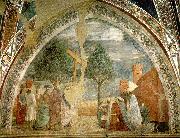Wholesale Oil Painting No Minimum |
|||||||||||
|
|
|||||||||||

|
|||||||||||
|
|
|
||||||||
Piero della FrancescaItalian Early Renaissance Painter, ca.1422-1492 Italian painter and theorist. His work is the embodiment of rational, calm, monumental painting in the Italian Early Renaissance, an age in which art and science were indissolubly linked through the writings of Leon Battista Alberti. Born two generations before Leonardo da Vinci, Piero was similarly interested in the scientific application of the recently discovered rules of perspective to narrative or devotional painting, especially in fresco, of which he was an imaginative master; and although he was less universally creative than Leonardo and worked in an earlier idiom, he was equally keen to experiment with painting technique. Piero was as adept at resolving problems in Euclid, whose modern rediscovery is largely due to him, as he was at creating serene, memorable figures, whose gestures are as telling and spare as those in the frescoes of Giotto or Masaccio. His tactile, gravely convincing figures are also indebted to the sculpture of Donatello, an equally attentive observer of Classical antiquity. In his best works, such as the frescoes in the Bacci Chapel in S Francesco, Arezzo, there is an ideal balance between his serene, classical compositions and the figures that inhabit them, the whole depicted in a distinctive and economical language. In his autograph works Piero was a perfectionist, creating precise, logical and light-filled images (although analysis of their perspective schemes shows that these were always subordinated to narrative effect). However, he often delegated important passages of works (e.g. the Arezzo frescoes) to an ordinary, even incompetent, assistant. |
||||||||
|
|
||||||||
Exaltation of the Cross
Exaltation of the Cross Painting ID:: 32465 |
c. 1466
Fresco, 390 x 747 cm
c. 1466 Fresco, 390 x 747 cm |
|||||||
|
|
||||||||
|
Juan de Valdes Leal Seville 1622-1690 was a Spanish painter of the Baroque era. He was born at Seville in 1622, and distinguished himself as a painter, sculptor, and architect. He worked for a time under Antonio del Castillo. Among his works are a History of the Prophet Elias for the church of the Carmelites; a Martyrdom of St. Andrew for the church of San Francesco at Cerdoba; and a Triumph of the Cross for la Caridad at Seville. He was one of the founders of the Seville Academy along with his friend, Bartolome Esteban Murillo. He died at Seville. His wife (daughter of Antonio Palomino), Isabella Carasquilla, was also a painter. She died at Seville as late as 1730. Their children were artists, including Lucas, Juan, Maria, and Laura de Valdes. His daughters specialized in portrait miniatures. Exaltation of the Cross mk84 1685 Seville,La Caridad, canvas 420x990cm |
||||||||
|
|
||||||||
|
Prev Next
|
||||||||
|
|
||||||||
|
Related Paintings to Juan de Valdes Leal :. |
||||||||
|
|
||||||||
|
CONTACT US |

